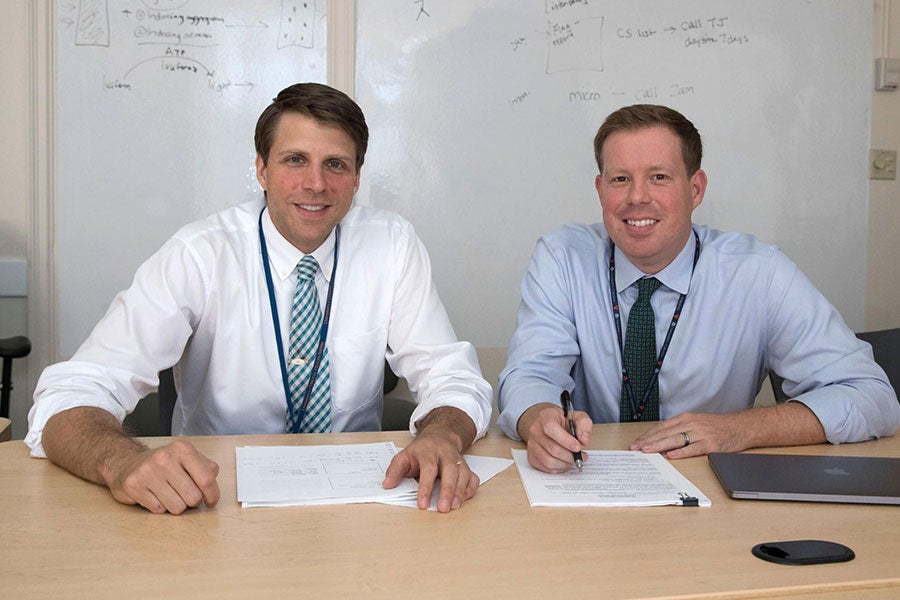
Joseph Wiencek, left, and Andrew Parsons, faculty members at the UVA Health System, are working with system colleagues to reduce lab costs while providing high-quality care for hospital patients. (Photos by Dan Addison, University Communications)
When a patient goes to a hospital for an ailment such as pneumonia, he or she expects thorough and appropriate care. Physicians work hard to provide that kind of high-value care. They have been trained to do this; it’s part of their ethos. The goal is to get the patient healthy and home as soon as possible.
But occasionally physicians, in an effort to be as thorough as possible, will over-request lab tests – repetitively checking blood chemistry changes to help inform their care decisions. This can provide valuable treatment information, but sometimes it also can be excessive.
The medical community considers over-requesting “labs” to be “low-value” care. Excessive testing is expensive and unpleasant for the patient because of the routine morning blood draws. It can lead to hospital-acquired anemia, and does not improve outcomes.
Sometimes more information is not better
Two faculty members with the University of Virginia Health System, Dr. Andrew Parsons and Joseph Wiencek, are working to make the lab testing culture at UVA a model for the broader medical community. They lead a task force dedicated to implementing high-value care concepts at the UVA Medical Center through the training of medical students, residents and fellows. Recently, they published a paper in the journal Clinical Lab Manager outlining ways to reduce the low-value services that result from over-utilization of labs.
“Low-value services, primarily blood tests and imaging, are a large part of health care waste in the United States,” Wiencek said. “These services, which cost over $300 billion per year, often could be eliminated without reducing health care quality.”
Wiencek is associate director of clinical chemistry at UVA and an assistant professor of pathology. He co-chairs the Health System’s Laboratory Stewardship Committee, which oversees lab usage trends.
“In addition to unnecessarily increasing health care costs, unnecessary lab testing also can cause a physician to make poor decisions based on clinically irrelevant abnormal results,” Parsons, an assistant professor of medicine, said. “This can trigger a cascade of additional testing, which may be medically unnecessary and even harmful to the patient.”
Parsons directs the School of Medicine’s clinical skills course (Foundations of Clinical Medicine I), is associate program director for the internal medicine residency and directs a continuing education program for physicians through the High Value Practice Academic Alliance.
Wiencek and Parsons said UVA is a leader in a national trend to cut down on excessive, high-cost medical care through various programs, such as the initiatives they lead.
“We need to change the culture of unnecessary repetitive lab testing,” Parsons said. “The best way to do that is to start with our medical students and residents, to create awareness early in their careers that they should be mindful of why they are requesting tests, rather than doing it as a matter of routine.”
In their paper, Wiencek and Parsons cite several ways that hospitals can provide high-value care while reducing labs.
UVA is using individualized and group feedback on laboratory ordering practices as a way to reduce unnecessary testing. Email reminders and dashboard data that anonymously compares broad data with individualized use helps care providers see where they stand compared to their peers. Reminders to “high utilizers” help to reduce the excess.
“It’s vital that the institution creates a culture that values and promotes high-value care across the board,” Wiencek said. “We’re doing that here at UVA with buy-in at the executive level and through the system. We have one-on-one conversations, presentations, and we share data to spread the message.”
Buy-in is easy, he said, when it becomes the cultural norm and people understand that the primary goal is appropriate patient care, rather than simply reducing costs.
Comparing ordering practices among physicians, even anonymously, also provides incentive for change. Parsons and Wiencek said that UVA has set up a chief resident-led initiative that provides residents with a weekly email containing individualized and team daily lab ordering practices to ease peer comparisons.
“When paired with an online educational module, these direct reports to physicians facilitate immediate and sustainable reduction in repetitive lab utilization,” Parsons said.
The Health System also is evaluating a decision-support system that uses electronic health records to identify trends among groups to help a decision support committee determine best approaches and practices for helping clinicians make better use of lab tests.
“In the education realm, where studies show that resident trainees are particularly prone to overutilization of common lab tests, instructors should teach principles of high-value care and serve as role models for practicing that care,” Parsons said. “At UVA, we’ve built it into the curriculum for first- and second-year medical students, and we’re conducting assessments based on established guidelines.”
UVA also is establishing a laboratory formulary committee to determine whether a specific lab test is evidence-based as part of routine care for certain illnesses. In some cases, tests may be restricted or entirely eliminated if found to contribute little to the overall effectiveness of treatment plans.
“To reduce repetitive laboratory testing and to provide the high-value care our patients deserve involves a multimodal approach,” Parsons said. “With buy-in from the top and throughout the Health System, we can provide high-quality care, help reduce costs and ensure our patients are more comfortable as we help them get well.”
By Fariss Samarrai, reposted from UVAToday
Filed Under: Media Highlights, Research

Comments